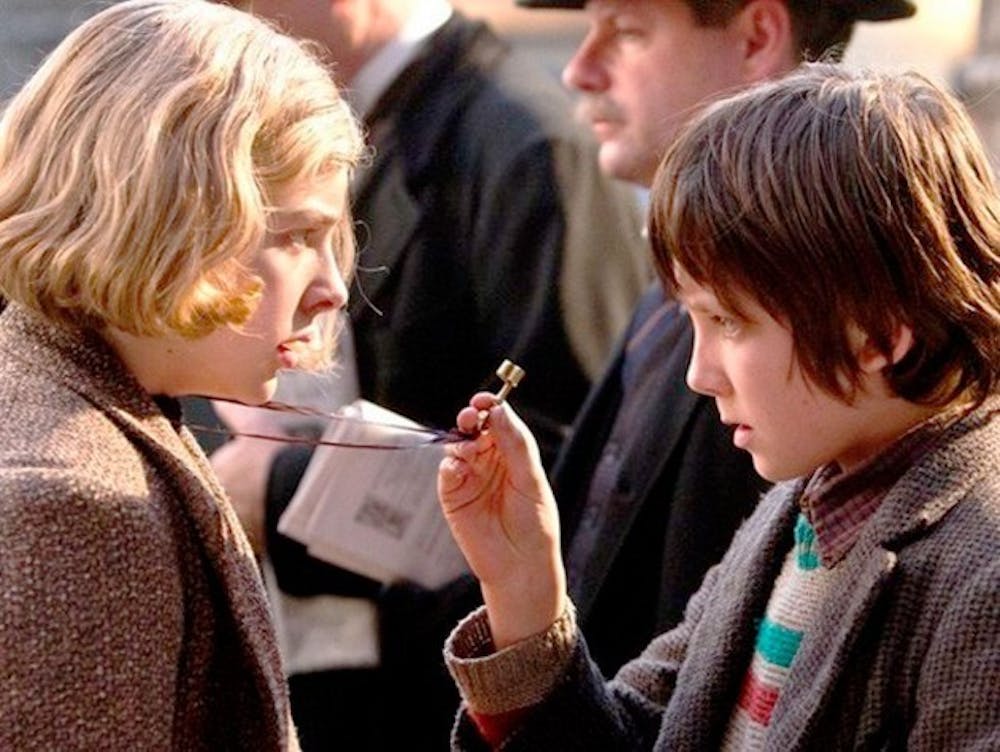Martin Scorsese is notorious for making the most perilous villains – the kind that show their treachery to the audience first-hand and then smile about it afterwards. Hugo has none of this darkness within its screen time.
Anyone who has watched a Scorsese movie can easily distinguish his niche for directing top-notch crime genre films, treading back to 1976 withTaxi Driver, and more recently the Academy Award-winning thriller, The Departed. Hugo is unlike any of Scorsese's past projects. It is an astonishing tale that demonstrates his true talent: a light, yet enthralling, fable that reaches to the heart of any spectator.
Set in a depression-era 1930s Paris, Hugo, based off the book The Invention of Hugo Cabret by Brian Selznick, follows the enchanting trek of 12-year-old orphan Hugo Cabret (Asa Butterfield, Nanny McPhee Returns). Hugo must unravel the mystery left behind by his father (Jude Law, Contagion) after his tragic demise. Hugo's only link to the case is an automaton, a robot operated by spinning gears that are designed for a certain task. According to Hugo's father, this specific automaton was built to write, but was found broken in a museum and has not scribed a syllable since.
Following the bizarre disappearance of his alcoholic Uncle Claude (Ray Winstone, Lost In Italy), the deprived orphan is left to his own devices, becoming a clock mechanic in a Paris train station. However, the boy does not show signs of regret, and stares out from the clock tower at the beautiful Paris skyline with admiration. The audience must then decide what it admires: the same scenery the boy does, or the fact that such a young person can take notice of the land before him. Scorsese gives the title character great depth early on, and forces his viewers to appreciate his adolescent protagonist.
During his stay at the station, the boy notices an odd toy maker (Ben Kingsley, Prince of Persia: The Sands of Time), who may conceal secrets of his own. After choosing to steal gadgets from the toy maker, Hugo is caught in the act, and unknowingly moves closer to solving his father's hidden message.
What may appear as a generic, happy child's tale will dazzle its spectators with authenticity for any audience to enjoy. Scorsese uses Paris as a living, interactive location filled with countless complex characters, as opposed to simply placing it as a luxurious backdrop for eye-appealing scenery.Interactions between the French inhabitants build an easy relationship between the audience and characters, making the entire ensemble relevant.
The most interesting character introduced is the nameless station inspector (Sacha Baron Cohen, Brüno). This inspector exemplifies various personalities that bring a unique presence to the scene. Most of the time he is shown as a stern authority figurehead to the French citizens, earning him respect from the crowd. Other times he shows a sudden fierce side towards the orphans that roam unattended. And although this man can be both stern and fierce, Scorsese somehow develops a compassionate feature inside of him that actually gives the inspector a humane feeling, instead of being a one-sided antagonist.
Hugo reminds moviegoers why films matter. In one scene, Hugo takes the toy maker's goddaughter Isabelle (Chloë Grace Moretz, Texas Killing Fields) to see her first motion picture. Her face expresses nothing short of astonishment, as her eyes witness for the first time a screen containing moving images. Movies are special creations that require innovative minds to decipher them, and this film is a perfect example of why cinema should be looked upon as a fantastic work of art.
With remarkable performances throughout this wondrous masterpiece, it is a must see for anyone in need of the perfect movie theater experience. Moretz has officially proved her worthiness of good roles, which partially started with her believable vampire character she in Let Me In. Butterfield was no disappointment either, making himself the witty kid everyone can't help but adore. Kingsley again portrays his exquisite skills on the screen, and may find himself a likely candidate at the Academy Awards.
That notion goes triple for Scorsese and his producers, who have made one of those rare works of art that is worth even two ticket purchases. Remember this film for Best Picture nominations.
Email: arts@ubspectrum.com





